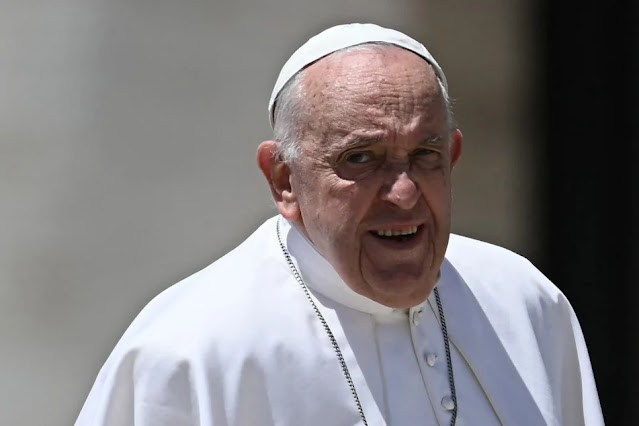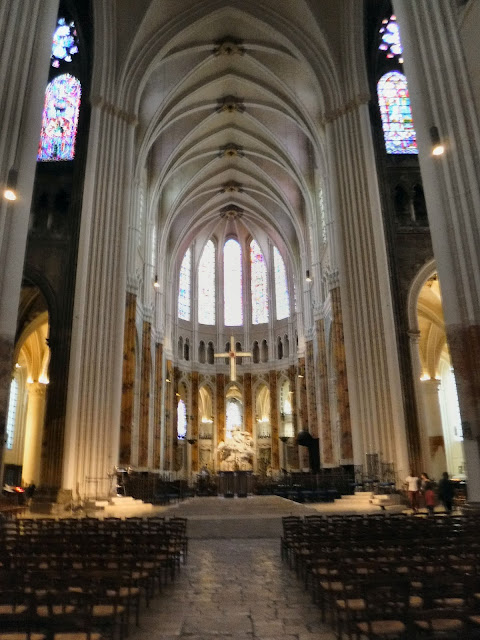Pope Francis gave an excellent elocution to the Eastern Rite, Syro-Malabar Church about the Latin Rite Church trying to colonize the Eastern Rite liturgy! By way of Pope Francis’ logic, we can say that Pope Paul VI’s Conslium, which fabricated the newly reformed Mass of the Latin Rite, not only tried to colonize the Eastern Rite with its innovations, like Mass facing the nave, but also the Latin Rite Liturgy by colonizing it with modernist views of the Church and her liturgy!
My astute comments embedded within the text of the pope in “red”.
Your Beatitude,
Your Excellencies,
Dear brothers and sisters,
I am pleased to welcome you, your brother bishops and those who have accompanied you on your first trip to Rome after your election. It was good to have this election! I also fraternally greet the representatives of the Syro-Malabar community in Rome.
The faithful of your beloved Church are known, not only in India, but throughout the whole world, for the “vigour” of their faith and piety. Your faith is of an ancient origin, as it is rooted in the witness to the point of martyrdom of Saint Thomas, the Apostle of India. You are all custodians and heirs of his apostolic preaching. You have had many challenges over the course of your long and difficult history, which has also seen some members of the faith commit unfortunate acts against you because of their insensitivity to the particular nature of your flourishing Church. Yet, you have remained faithful to the Successor of Peter.
And so it gives me great joy to welcome all of you and to confirm you in the glorious legacy that you have received and which you carry forward. You are obedient, and where obedience is present, there is the Church. Where there is disobedience, there is schism. You are obedient; this is one of your glorious attributes: obedience. I know this is not without suffering, but continue to press forward. (Obedience to the authentic teachings of the popes uncontested by other bishops, is a hallmark of Catholics, clergy and laity!)
Your history is unique and precious, and it is a special heritage for all God’s holy people. And I take this opportunity to stress that Eastern traditions are indispensable treasures in the life of the Church. This is especially important to recall in a time like ours, which severs the roots connecting us to the past and measures everything based on what is useful and immediate. (If the pope would only say this to those who embraced Pope Benedict’s Summorum Pontificum and with gusto, rather than calling them backward looking and demanding that Latin Rite Catholics walk in lockstep with only what is useful and immediate by jettisoning the Latin Rite’s rich liturgical heritage!) This unfortunately can also include religious attitudes. The Christian East allows us to draw from ancient and ever new sources of spirituality; these become fresh springs that bring vitality to the Church. It is, therefore, good for me, as Bishop of Rome, to encourage you, the Syro-Malabar Catholic faithful, wherever you are, to cultivate the sense of belonging you have to your Church sui iuris, so that your great liturgical, theological, spiritual and cultural heritage may shine ever more brightly. (Again, if only Pope Francis could be humble enough to say this very same thing to those who were obedient to Pope Benedict’s Summorum Pontificum and what Pope Benedict told the entire Latin Rite Church about our liturgical heritage!)
I also told His Beatitude to ask for jurisdiction with regard to all your migrants in so many parts of the Middle East. I said that they have to ask for jurisdiction in writing, but I have given it today and they can already exercise it. This has to be put in writing, but again, as of today, you can exercise it. I wish to help you, not supersede you, because the nature of your Church sui iuris empowers you not only to examine carefully the situations and challenges that you face, but also to take appropriate steps to address them, with responsibility and evangelical courage, remaining faithful to the guidance of the Major Archbishop and the Synod. This is what the Church wants, for apart from Peter, apart from the Major Archbishop, there is no Church.
To this end, I have recently sent letters and a video message to the faithful, warning them of the dangerous temptation to focus on one detail, (i.e. celebrating their Liturgy in a novel way by facing the congregation rather than obedience to the now expected posture of ad orientem for the Liturgy of the Eucharist) and an unwillingness to let it go, even to the detriment of the good of the Church. It stems from a self-referentiality, which leads to listening to no other way of thinking but one’s own. In Spanish we call this self-referentiality “yo, me, mi, con migo, para mi”: “I, me, with me, for me, everything for me”. It is here that the devil, the divider, who truly exists, creeps in and thwarts the most heartfelt desire that the Lord expressed before dying for us: that we, his disciples, be “one” (Jn 17:21), without division and without breaking communion. For this reason, guarding unity is not a pious exhortation but a duty, and it is especially so when it concerns priests who have promised obedience and from whom the faithful expect the example of charity and meekness. (Pope Francis wants obedience to ad orientem since it is not only the Latin Rite’s rich liturgical heritage, but that too of the Eastern Rite, thus uniting both rites in celebrating the Divine Liturgy in the same direction!!!!)
Your Beatitude, let us work with determination to protect communion and pray tirelessly that our brothers and sisters, tempted by a worldliness that leads to rigidity and division, may realize that they are part of a larger family that loves them and waits for them. Like the Father in the parable of the prodigal son, let us leave the doors open and our hearts open so that, once they have repented, they will not find it difficult to re-enter (cf. Evangelii gaudium, 46): we are waiting for them. Let us meet and discuss without fear, this is fine, but above all, let us pray, so that the light of the Spirit, which reconciles differences and brings tensions back into unity, may resolve disputes. There is one certainty: pride, recriminations and envy do not come from the Lord and never lead to concord and peace. Showing a grave lack of respect for the Blessed Sacrament – the Sacrament of charity and unity – by arguing about the details of how to celebrate the Eucharist, the pinnacle of his presence among us, is incompatible with the Christian faith. The guiding criterion, the truly spiritual one that derives from the Holy Spirit, is communion: this requires us to do a self-examination of our dedication to unity and our faithful, humble, respectful and obedient care for the gifts we have received. (Yes, the liturgical progressives in the Syro Malabar rite, have caused violence and chaos and sacrilege as well as vandalism due to their rigid opposition to ad orientem for the Liturgy of the Eucharist and closed mindedness to their own liturgical past much like what the progressive left has done in the Latin Rite, but aided and abetted by Rome and modernist liturgists!)
I would like to say to everyone, in moments of difficulty and crisis, do not be overcome by discouragement or a sense of helplessness in the face of problems. Brothers and sisters, let us not extinguish hope, grow weary of patience, or close ourselves off to prejudices that fuel animosities. Rather, let us think about the vast horizon of the mission that the Lord has entrusted to us, the mission to be a sign of his loving presence in the world, and not a scandal to those who do not believe! When making decisions, let us think of the poor and the estranged, those on the peripheries, in India and the diaspora, and those in an existential crisis. Let us also be mindful of those who are suffering and waiting for signs of hope and consolation. I know that the lives of Christians in many places are difficult, but the difference is that we Christians respond to evil with good and we work tirelessly with all believers for the good of humanity. (Pope Francis could say this to those suffering due to their fidelity to Summorum Ponticum and renewal in continuity which is derided and mocked by the progressive liberals of the Latin Rite Church.)
I would like to thank you for your Church’s commitment in the areas of family formation and catechesis, and I support your pastoral work aimed at youth and vocations. I am close to you in prayer and carry you in my heart every day. Please also take my encouragement to your brothers and sisters.
Together we look to Jesus, crucified and risen, who loves us and makes us one, who wants us united as one family around one altar. Like the Apostle Thomas, let us look at his wounds. They are still visible today on the bodies of the hungry, thirsty and discarded, those in prisons, hospitals and on the streets. As we touch these brothers and sisters with tenderness, we welcome the living God in our midst. Like St. Thomas, we look at the wounds of Jesus, which had stunned the disciples and could have thrown them into a hopeless guilt, and see that it is from those wounds the Lord made channels of forgiveness and mercy. A big heart, always a big heart! What amazement must have seized the Apostle Thomas as he contemplated them and saw his doubts and fears vanish before the greatness of God! It is an amazement that generates hope, an amazement that prompted him to go out, to cross new borders and to become your father in faith. Let us cultivate this amazement of faith, which enables us to overcome every obstacle!
And you, dear faithful of the Syro-Malabar community in Rome, descendants of the Apostle Thomas in the city of Peter and Paul, have a special role to play. From this Church, which presides over the universal communion of charity (cfr. Saint Ignatius of Antioch, Letter to the Romans), you are called to pray and cooperate in a special way for unity within your Church, not only in Kerala but also throughout India and the whole world. Kerala is a treasure-trove of vocations! Let us pray that it will continue to be so.
Your Beatitude, thank you for this fraternal visit; I am pleased by it. Dear brothers and sisters, from the bottom of my heart I bless you and entrust you to the Virgin Mary, Saint Thomas the Apostle and your saints and martyrs; and I ask you, please do not forget to pray for me. Thank you, thank you very much!
Francis,
Bishop of Rome
Patriarch of the West


































